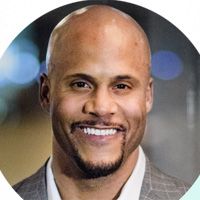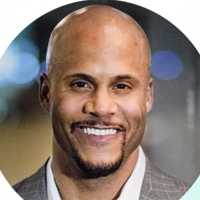Without (Increasing) Income, There Is No Retirement
Your retirement security boils down to how much sustainable cash flow your retirement assets can safely and reliably produce.


Profit and prosper with the best of Kiplinger's advice on investing, taxes, retirement, personal finance and much more. Delivered daily. Enter your email in the box and click Sign Me Up.
You are now subscribed
Your newsletter sign-up was successful
Want to add more newsletters?

Delivered daily
Kiplinger Today
Profit and prosper with the best of Kiplinger's advice on investing, taxes, retirement, personal finance and much more delivered daily. Smart money moves start here.

Sent five days a week
Kiplinger A Step Ahead
Get practical help to make better financial decisions in your everyday life, from spending to savings on top deals.

Delivered daily
Kiplinger Closing Bell
Get today's biggest financial and investing headlines delivered to your inbox every day the U.S. stock market is open.

Sent twice a week
Kiplinger Adviser Intel
Financial pros across the country share best practices and fresh tactics to preserve and grow your wealth.

Delivered weekly
Kiplinger Tax Tips
Trim your federal and state tax bills with practical tax-planning and tax-cutting strategies.

Sent twice a week
Kiplinger Retirement Tips
Your twice-a-week guide to planning and enjoying a financially secure and richly rewarding retirement

Sent bimonthly.
Kiplinger Adviser Angle
Insights for advisers, wealth managers and other financial professionals.

Sent twice a week
Kiplinger Investing Weekly
Your twice-a-week roundup of promising stocks, funds, companies and industries you should consider, ones you should avoid, and why.

Sent weekly for six weeks
Kiplinger Invest for Retirement
Your step-by-step six-part series on how to invest for retirement, from devising a successful strategy to exactly which investments to choose.
You’ve got a valuable home and a hefty retirement portfolio, but cash flow may be the most underrated tangible asset that you have.
Cash flow is the lifeblood of financial security, happiness and freedom. Run out of this or have it reduced, and your world can be turned upside down. For example, the difference between most homeless people and those who are not homeless, financially speaking, is that usually a homeless person doesn’t have enough cash flow to pay for housing, and a person with a home does.
For most of us, cash flow is derived from working. This income allows us to acquire assets such as real estate, stock market investments, retirement plans and interest in a business. In the end, the purpose of those assets is to create an income stream that can eventually replace your paycheck from a job. This is called building wealth, and it’s something most of us work toward our entire lives. Wealth can mean the freedom to do the things we love, as well as avoid the things we don’t. Whether you’re looking to retire early from a career that’s great for your wallet but bad for your physical or emotional well-being, or maintain your lifestyle in retirement, you need to replace your paycheck.
From just $107.88 $24.99 for Kiplinger Personal Finance
Become a smarter, better informed investor. Subscribe from just $107.88 $24.99, plus get up to 4 Special Issues

Sign up for Kiplinger’s Free Newsletters
Profit and prosper with the best of expert advice on investing, taxes, retirement, personal finance and more - straight to your e-mail.
Profit and prosper with the best of expert advice - straight to your e-mail.
No ‘Magic Number’ Needed to Retire?
While some people think they need to reach a certain “number” in order to retire, it’s really about creating cash flow that you cannot outlive. For example, imagine that Bob earns a salary of $100K at a big corporation. At retirement, Bob will receive a pension benefit from his employer of 80% of that salary. That 80% pension income is enough for Bob to live the life he wants in retirement, even though he never invested much of his money in a 401(k) or other retirement plan. What does his income look like once he quits working? His pension pays $80K per year with cost-of-living adjustments, he receives a Social Security benefit, and his children are financially independent.
How “stressed” is Bob leading up to and in retirement? Probably not too stressed. Bob, like my grandparents who had a pension, didn’t stress too much about retiring. In fact, because of pensions — which is another way of saying, stable, guaranteed income for life — they didn’t need a large amount of investments or assets. They also didn’t need to accumulate a "magic" number to be able to say, "Now I can retire because I have X dollars." They were secure because they had a guaranteed source of income.
Ultimately, it’s about how much reliable cash flow you’ll have in retirement, not how much you have saved, or even what rate of return you get.
What About the Rest of Us Who Don’t Have Pensions?
Pensions, for the most part, are uninterrupted, stable, guaranteed income streams, but many of today’s retirees don’t have them. Instead, today’s retirees should ask themselves how many years of uninterrupted, increasing income their assets can produce. The primary purpose of portfolios, real estate, retirement plans, financial products and strategies is to create that income. Here’s proof: You don’t take your statements, your assets, or your equity to the supermarket, you take your income. You don't take your statements or asset balances to the doctor, you take your income. You don't take your assets and statements on vacation. You take your income.
Without reliable income that keeps up with inflation, you can’t have full security in retirement, especially when you consider increasing life spans. It’s much harder to figure out how to create income for that long than to aim for good investment returns. While we often judge how well we’re doing based on those returns, the equations change significantly once we start drawing down that money to live off of. In other words, it doesn’t do you any good to be sitting on a park bench at age 75 or 80 saying you beat the other guy or the market if you don’t have two nickels to rub together.
How One Couple Made It Work
Let’s take a hypothetical example: Say a couple in their mid-60s is looking to retire. They have saved a substantial amount of retirement but are worried about running out of money because neither has a pension. They’re also concerned about the market and inflation. Even though they think they have enough money, these variables inject uncertainty and worry. What can they do?
They might start with figuring out how much they’ll get from Social Security, and how they might maximize their benefit. From there, they can calculate how much additional monthly income they’ll need to achieve the lifestyle they want in retirement. Next is figuring out how to fill in that gap – this might mean deciding how much to withdraw from an IRA each year or investing in an annuity that would provide steady payments for the rest of their lives. Their objective is to figure out how to turn a lump sum of savings into a regular income stream.
Here are a few questions to ask yourself and your adviser in your next meeting:
- “How much uninterrupted, increasing income can my savings, investments and retirement accounts generate?”
- “What could interrupt, reduce or destroy this income stream?”
- “What happens when the market goes down? Where will I pull the needed income from while my investment portfolio recovers?
- “What happens if tax rates rise to the point that taxes start to reduce my spendable income?”
- “What happens if the cost of living increases at a rate greater than I anticipated?”
The essential question to ask yourself is, “How much monthly income do I need in retirement, and how am I going to generate it?”
When it comes to retirement, especially in today’s inflationary environment, you should be asking yourself how you’ll protect your purchasing power and create the life you want for yourself in retirement.
A financial adviser can help you answer those questions and create a plan tailored to your needs. This means looking beyond “the numbers” to how you will actually live in retirement, how you will address your biggest concerns, and how you will achieve the lifestyle you want for as long as you live.
For more information and important disclosures, please visit https://finleyalexander.com/.
Profit and prosper with the best of Kiplinger's advice on investing, taxes, retirement, personal finance and much more. Delivered daily. Enter your email in the box and click Sign Me Up.

Kyle Winkfield, president of Finley Alexander Wealth Management, is a breath of fresh air to the financial industry, empowering clients and public audiences through education and straight-forward concepts. Personal finance is a topic that unnerves many Americans and the barrage of industry jargon and fast talk leaves most uncertain about what is best for them and their families. A portfolio is not a plan, and what sets Kyle’s clients apart from the rest is they have a written plan for retirement achieving financial freedom and lifestyle security.
-
 Quiz: Do You Know How to Avoid the "Medigap Trap?"
Quiz: Do You Know How to Avoid the "Medigap Trap?"Quiz Test your basic knowledge of the "Medigap Trap" in our quick quiz.
-
 5 Top Tax-Efficient Mutual Funds for Smarter Investing
5 Top Tax-Efficient Mutual Funds for Smarter InvestingMutual funds are many things, but "tax-friendly" usually isn't one of them. These are the exceptions.
-
 AI Sparks Existential Crisis for Software Stocks
AI Sparks Existential Crisis for Software StocksThe Kiplinger Letter Fears that SaaS subscription software could be rendered obsolete by artificial intelligence make investors jittery.
-
 Social Security Break-Even Math Is Helpful, But Don't Let It Dictate When You'll File
Social Security Break-Even Math Is Helpful, But Don't Let It Dictate When You'll FileYour Social Security break-even age tells you how long you'd need to live for delaying to pay off, but shouldn't be the sole basis for deciding when to claim.
-
 I'm an Opportunity Zone Pro: This Is How to Deliver Roth-Like Tax-Free Growth (Without Contribution Limits)
I'm an Opportunity Zone Pro: This Is How to Deliver Roth-Like Tax-Free Growth (Without Contribution Limits)Investors who combine Roth IRAs, the gold standard of tax-free savings, with qualified opportunity funds could enjoy decades of tax-free growth.
-
 One of the Most Powerful Wealth-Building Moves a Woman Can Make: A Midcareer Pivot
One of the Most Powerful Wealth-Building Moves a Woman Can Make: A Midcareer PivotIf it feels like you can't sustain what you're doing for the next 20 years, it's time for an honest look at what's draining you and what energizes you.
-
 I'm a Wealth Adviser Obsessed With Mahjong: Here Are 8 Ways It Can Teach Us How to Manage Our Money
I'm a Wealth Adviser Obsessed With Mahjong: Here Are 8 Ways It Can Teach Us How to Manage Our MoneyThis increasingly popular Chinese game can teach us not only how to help manage our money but also how important it is to connect with other people.
-
 Looking for a Financial Book That Won't Put Your Young Adult to Sleep? This One Makes 'Cents'
Looking for a Financial Book That Won't Put Your Young Adult to Sleep? This One Makes 'Cents'"Wealth Your Way" by Cosmo DeStefano offers a highly accessible guide for young adults and their parents on building wealth through simple, consistent habits.
-
 Global Uncertainty Has Investors Running Scared: This Is How Advisers Can Reassure Them
Global Uncertainty Has Investors Running Scared: This Is How Advisers Can Reassure ThemHow can advisers reassure clients nervous about their plans in an increasingly complex and rapidly changing world? This conversational framework provides the key.
-
 I'm a Real Estate Investing Pro: This Is How to Use 1031 Exchanges to Scale Up Your Real Estate Empire
I'm a Real Estate Investing Pro: This Is How to Use 1031 Exchanges to Scale Up Your Real Estate EmpireSmall rental properties can be excellent investments, but you can use 1031 exchanges to transition to commercial real estate for bigger wealth-building.
-
 Should You Jump on the Roth Conversion Bandwagon? A Financial Adviser Weighs In
Should You Jump on the Roth Conversion Bandwagon? A Financial Adviser Weighs InRoth conversions are all the rage, but what works well for one household can cause financial strain for another. This is what you should consider before moving ahead.